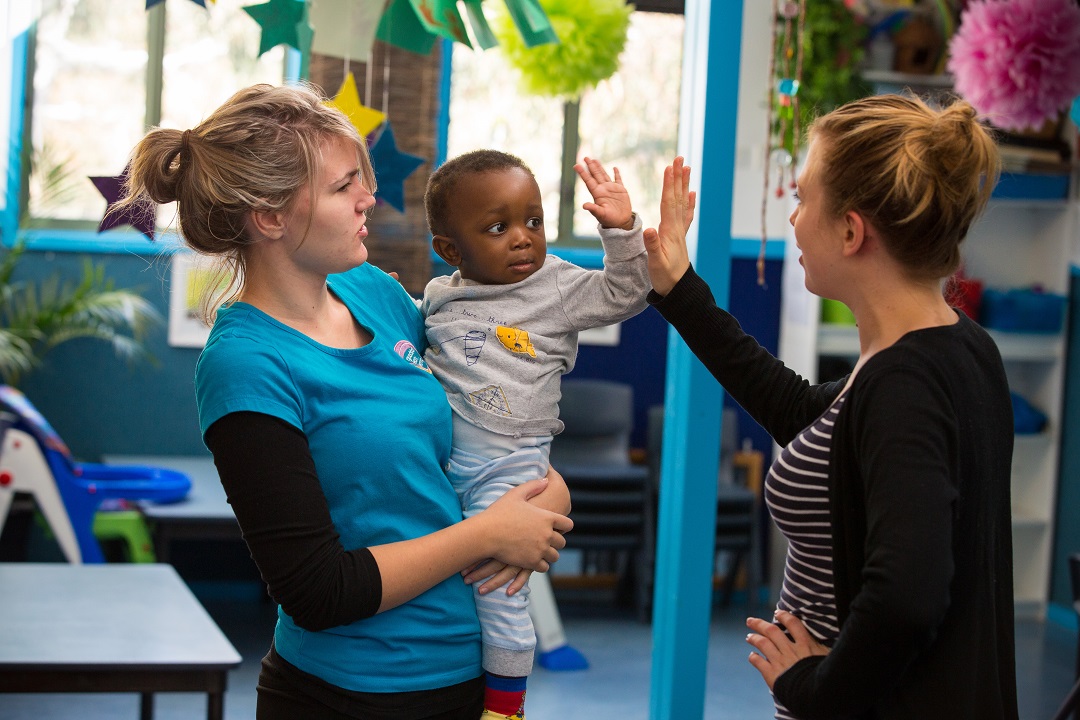It’s hard to believe that Christmas has almost rolled around once again. All around the country early childhood services will be madly scrambling to finish portfolios and be dusting off the boxes of Christmas decorations that were unceremoniously shoved in the back of the shed in mid-January.
It’s also the time of the year when I start to question how we approach celebrations in Australian ECEC services, and get called “Grinch” a lot.
So, I’ll have to start this post off the same way I start off conversations I have with people in person.
I don’t hate Christmas. Actually, I like it! I loved it as a child, and we celebrate it at home with our two children.
I don’t think Christmas should be banned from centres. Outright bans on anything we do should always be critically questioned.
Suitably prepared, here comes the “but…”
(This is normally when the people I’m talking to tense up and clutch their tinsel and reindeer antlers protectively.)
Here are my problems with how I have seen Christmas (and a number of other celebrations) explored in children’s services.
1. It’s by default. December 1st (or thereabouts) rolls around on the calendar, and we start doing “Christmas things”. The Early Years Learning Framework challenges us to be intentional and meaningful in our teaching. Transforming your service into Santa’s Grotto just because of a date is neither intentional nor necessarily meaningful.
That is not to say that you cannot find intentional teaching opportunities in the themes, rituals and community connections of Christmas – but if we are truly honest with ourselves, is that why we are doing it? Or are we doing it because we’ve always done it, and everyone else is doing it?
2. It’s limiting. Yes, Christmas is the dominant cultural celebration in our country. Ignoring it is not reflective of the lives of the children in our service. But it is not the only important event happening for children in December. By prioritising Christmas, what are we missing? As the EYLF asks, who is advantaged and disadvantaged when we work in certain ways?
Christmas is everywhere – children will experience it regardless of what we do. But will every child learn about Ramadan, or Eid, or other significant events for other children around the world if we ignore it? What might that mean to the children and families in your community who do celebrate those events?
3. It’s overwhelming. Christmas takes over everything. Decorations are out and activities usually start at the beginning of December and don’t stop until the end of the year. No other event on the calendar gets that focus. Imagine if NAIDOC Week was a month-long event for centres, with weeks of preparation leading up to it? What if centres took International Day of the Girl Child as seriously?
Many will disagree with me, but I think both of those two examples are richer, more meaningful provocations for learning with children. (I’ll quickly note that there will undoubtedly be centres who are doing those things, but it is certainly not the norm.)
Again, what are we missing out on by turning over our entire program to one event – that is celebrated in every other part of the community?
I know that even these three points will provoke fierce debate. I’m fully prepared to wear the Grinch label once again. But to say again – I am not calling for “bans on Christmas”. But I absolutely will say that for services that strive for high quality programs, ask questions about your celebrations.
What are children learning, and what are they not learning? Who is advantaged, who is disadvantaged? What could we do differently this year?
This post was originally published at LiamMcNicholas.com












Hi Liam, thanks for sharing your thoughts on this topic. I have similar views. It is not about not celebrating events such as Christmas or Easter, but it is about balance. Do we take the time to find out how all our families feel about such celebrations? Have we considered families who are living in poverty and may not be able to afford to celebrate Christmas with their children?
When we take a bit longer to fully plan what we do and why, while considering children’s inclusion, our programs will be all the richer for it.
One of our educators has just had a conversation with me about how she has consulted with the families of the children who attend, found out who does not celebrate Christmas, asked them how they would feel if this were to be a project in the room and also what events do they celebrate that we could learn more about. This educator works with children from 6 weeks to 3 years of age.
Hi Lynne, thanks for commenting! There are certainly many reflections that could be made about the Christmas period that I could not cover in this short blog post, and I think your point about families experiencing poverty is highly relevant.
Consultation with families is certainly a great place to start – good luck to that educator!
Hi Liam
Thanks for this timely provocation. We have not “done” Christmas in our service for over 10 years, though we do celebrate the end of the year as we say goodbye to families. Having said that it doesn’t mean we ban the discussion of Christmas and other family rituals with children. “Who is it for” is a good reflection point for educators. I also think about belonging, and challenge educators to think about how families may lose their sense of belonging and connection, but not have the confidence to tell us. As Lynette suggested it is important to ask families. (I’d add that I have been called Grinch as well, but my family sighs at my over the top christmas rituals)
Hi Lisa,
It doesn’t surprise me at all that your centre has come up with a reflective approach to this! “Who is it for” is a great question for everything we do.
(Also, happy to welcome you to the Grinch club).
Thanks Liam for your reflection. It has been good to also read follow up comments. Christmas is one of the significant celebrations on our calendar and I often wonder why it stirs up so much debate, particularly in child care centres? As we listen to children they share with each of us the excitement, joy and anticipation of Christmas. If their families don’t celebrate Christmas there are likely to be other celebrations that stir up this same excitement. My provocation to those educators who seem offended, or disgruntled by visibly acknowledging Christmas is “Why the offense?” As educators we can model to our children and families how important it is to acknowledge cultures and their various celebrations. I see no difference in this …. the celebration of the birth of Jesus. Perhaps this leads us to an inner stirring of our own beliefs. In which case, let’s recognise this, and leave these personal beliefs aside as we listen to and celebrate significant events in each of our children’s lives.
Hi Ness,
Thanks for the feedback on the piece, and really appreciated you taking the time to comment.
I think the point about “taking offence” is interesting. For me, it’s not about taking offence, I just wonder why this particular celebration is given so much time and space in services compared to others. In my experience, Christmas celebrations tend to take up the entire month of December!
I think it would be interesting if we gave that level of focus to other events that are also meaningful to children, or perhaps should be more so.
All the best!
I agree with points made by Ness. Where I work we do celebrate Christmas, as do almost all of our families. But we also spend significant time on other celebrations, from different cultures. This year, for the first time, we have celebrated Thanksgiving, as we have a staff member from the United States. We try to place the emphasis of our Christmas celebrations on kindness and giving and always have a donations box to give to the Salvation Army. We explain to children why we have this box and encourage them to share this explanation with their families.
I’d really like to think that the debate around Christmas and the inclusion of celebrations from other cultures is “old hat” but maybe not!
Hi Ness I was thinking along the same lines as you.I was wondering why Christmas stirs such resentment and even anger in people. Good Comment/ question, I am thinking that there is more to Christmas than the spending side but it is really about giving and in each centre this could be a wonderful opportunity to give to others less fortunate. This could be in the form of something as simple as a painting to people in a local Nursing Home or a card and perhaps a visit. The first Christmas was about giving. Thanks for your comment.
I believe Christmas is heavily celebrated in this country as a whole because it is a well known and loved event. I know of immigrants who want to learn about the meaning of Christmas and celebrate with us because we embrace it so strongly.
Prior to this Christmas I felt that society/retail went ‘over board’ with Christmas cheer, however this year I have a 3 yr old foster child in my care who has never celebrated this season before – she is naturally being exposed to all the bells, trees, santas, etc, etc in the service and in the shops and she is beaming with delight. Why would I want to ‘play down’ this experience and learning opportunity?
Nic you are right. There is a learning opportunity in everything we do and you have given two examples. How to give! and also how to receive! This little person may have never known such joy if you had felt it was too commercialized or not for her belief. Thank you for giving love and experiences to such a needy person.
A fascinating discussion is definitely worth comment.
There’s no doubt that that you need to publish more about this subject matter,
it might not be a taboo matter but typically
people don’t discuss such topics. To the next!
Best wishes!!
Not a fan of Xmas Liam I was in woolies the other day and saw a girl with a scarf and the ridiculous red santa shirt on. I asked her if this was something she was required to wear or if it was optional she replied “OH I DON’T MIND” I said “I do”
We are in the process of reviewing our celebrations policy and have had so many questions come up regarding the authenticity of current celebrations. We celebrate birthdays, Easter and Christmas- all the mainstream western celebrations. Recently, we have welcomed two families and one educator to our service who are Jehovahs Witnesses and do not celebrate any of the celebrations listed above. We are now wondering how to ensure celebrations are culturally sensitive and reflective of ALL our families. But the question we struggle with is: if we celebrate birthdays and Christmas because the vast majority of families do, how does that make our families/educators feel who don’t celebrate? On the flip side, how do we ensure we respond in a culturally appropriate manner, meaning that our families and children who do celebrate birthdays/Christmas feel included?
Unfortunately it seems like an impossible task, but we’re up to the challenge
This conversation needs to be a ever present. If we really value great communicators who are actively engaged in learning and have a great sense of self. We must model this. Each year the cohort of children and their families changes. Each year we learn more about inclusiveness. We reflect on our policies every year to make sure we are current and reflect the families we cater for. I for one think we should celebrate what is important for each family… each family should be offered an opportunity to share what and why certain dates matter. For instance. Jehovahs do celebrate… just not birthdays and Christmas. Creating a centre culture of openness, learning and sharing should solve all the problems faced…. and a month of Christmas is worthy, if it is child led… and I guarantee if it is child led it will be far richer than decorations and teachers making gifts of children’s learning. There is an art in pedagogy that holds the voice of the children as its priority. And to have that voice acknowledged and celebrated will prove that celebrations have spirit.. They are not the consumerist smash in the head we are subjected to when we go shopping. Yes that was dramatic! I do get carried away too <3
This blog post was an interesting read. It has definitely made me reflect on the celebration of Christmas and the amount of time and effort dedicated compared to other celebrations. I am currently struggling to implement a weekly program that is intentional, meaningful and caters for each child’s strengths, abilities and current interests. I feel as though I might be using this celebration as a “time filler” and planning art and craft experiences centred around this theme for the month of December. It is interesting to reflect on this perspective and also the question asked by many; “Who is it for?”. Thank you for sharing your thoughts. I enjoyed reading and gaining professional insight.